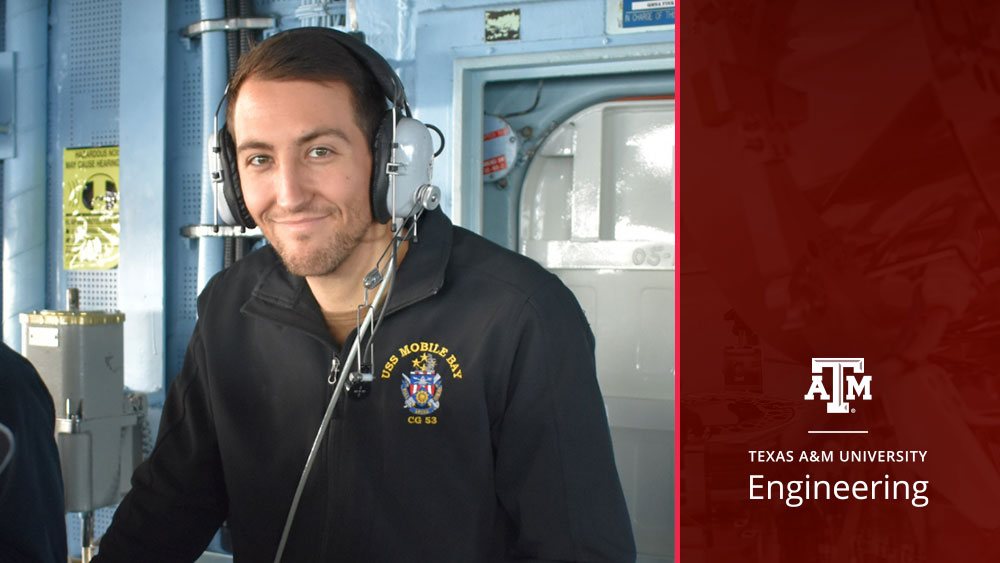
Alex Rubin ‘17, former student in the Department of Nuclear Engineering at Texas A&M University, joined the United States Navy after graduation. As a division officer and nuclear engineer, he describes what he’s learned as a sailor and where his journey will take him next.
Q: What made you want to study nuclear engineering?
A: I was always interested in science and engineering, even in high school. My grandfather and his two brothers attended A&M, so I had some strong family ties already. I knew that I wanted to study engineering, but in the end, it came down to nuclear and aerospace. Nuclear was considered a potential source of energy for the world and I was really excited about it. I wanted to be part of that.
Q: You’re currently employed with the United States Navy — a promising option for many nuclear engineering students due to the nuclear-powered submarines. What has the job-hunting industry been like?
A: I became interested in the Navy when I was a sophomore and met with a recruiter. I learned about the nuclear power prototype schools they offered and the opportunities I would have to operate a reactor or go work on either a submarine or aircraft carrier. They had a lot of incentives and benefits, and around nine months later, after six rounds of technical interviews, it was a no-brainer for me.
Q: You chose to work on surface ships, correct? What’s that experience like?
A: Surface naval officers oscillate between nuclear work and Navy work. For instance, my first tour was a two-year tour with a seven-month long around-the-world deployment where I learned all about ship driving and combat control. We also learned about the refueling and maintenance process. We stopped in San Diego, Singapore, Thailand; Dubai, Bahrain, Marseille, France and Cartagena, Colombia. Now, I’m stationed in Charleston attending the Navy’s nuclear power school.
Q: That’s a lot of traveling, where do you think you’ll go next?
A: There are only four places where aircraft carriers are stationed, so my options are either Japan, San Diego, Washington State or Virginia, and I’m hoping for Japan.
My favorite part is truly the dynamic lifestyle — you’re never doing one thing for too long.
Q: What else are you learning right now?
A: Right now, I’m at prototype, which means we visit a training submarine to learn the ins and outs of everybody’s job on the ship. We also learn about basic plant operations and accident scenarios. Submarines are very different than a commercial power plant — for example, the ship takes in water from the ocean. So, making sure that our water is pure and clean is a really big deal. There’s a lot more educated piping too. What happens when potentially different grades of water are exposed to each other? That’s a bad day on the submarine.
Q: What’s your favorite part about your job?
A: My favorite part is truly the dynamic lifestyle — you’re never doing one thing for too long. As soon as you learn one skill and get comfortable doing that, you’re moving on to the next thing. I’ve learned a lot of life lessons in a very short amount of time. Everything from the intricacies of engineering submarines to how to adjust my sleep schedule and adapt to being away from family and friends from extended period of times.
Q: How long would a sailor normally be at sea for?
A: It depends on the situation, but most ships follow a three-year cycle that includes several training exercises, a six- to eight-month deployment period and then a long maintenance period.
Q: What advice would you give to a nuclear engineering student considering pursuing a career in the Navy?
A: I would advise them to do as much as possible to learn about things you want to do. As an undergraduate, maybe you’ll hear someone mentioning working in the Navy or perhaps operating a nuclear power plant. It’s easy to pinpoint on one thing and say — oh, this is the career I’m going to pursue and that’s it.
But there’s a lot of things to consider that they don’t always tell you about: what sort of lifestyle do you want to live? Do you want to travel? Do you want to make a name for yourself? What sort of hours are you looking to invest? Are you interested in starting a family soon?
I’d also remind students that jobs aren’t forever. You can always change your mind and figure it out as you go. Of course, joining the Navy is a very big commitment. It’s not easy to quit, but you certainly can. So, be aware of the decisions you’re making and the type of commitments they may carry, too.